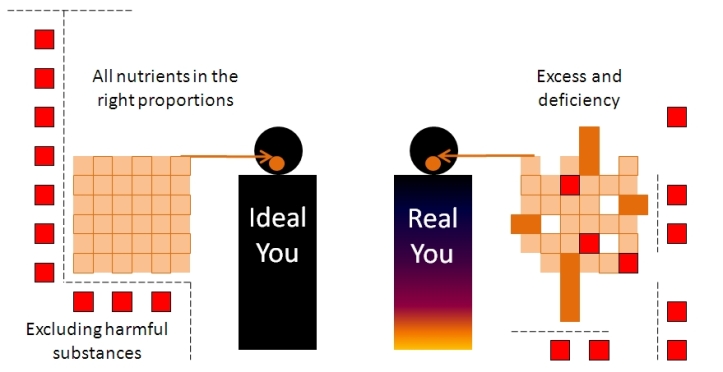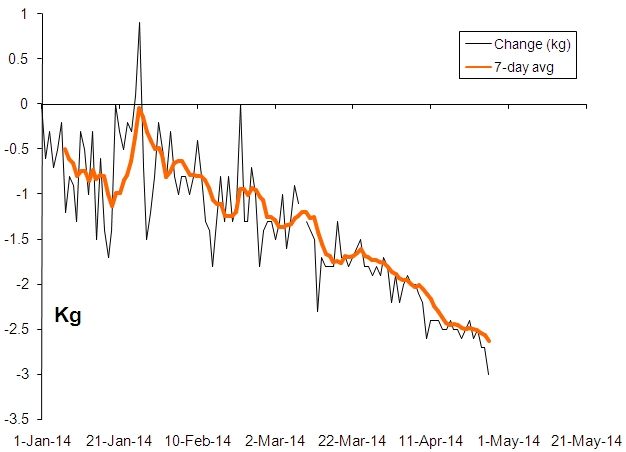
Originally published here on 27-Apr-2014 at www.Enerzal.me
This is a re-print of that article.
Don’t Go with the Flow of Mass Hysteria
Election fever has hit India, and in Mumbai, where I live most of the year, the turnout to vote was not particularly high. I am not eligible to vote, but that does not bother me – even where I am eligible, I prefer to be a free rider. But when it comes to what I eat and drink, I do my best to ensure that the ‘intelligence of the masses’ does not determine what I decide to consume. I prefer to rely on science and I think you should too.
What interests me about the Indian elections is the ferocity of arguments in the media. And one of the prominent angles that always appears as an important part of debates is about the economic inclusion and exclusion of this group or that – grouping by gender, age, religion, region, wealth… the list is long. In my earliest blogs I spoke to you about food nutrition groups. Today I am going to talk about inclusion and exclusion in food – something you can actually have a 100% impact on!
Unlike the election process, where the bulk of the population participates, when it comes to tests of excess or deficiency in nutrients, it is often difficult to say much about the population, and even less about you specifically. You only know what you are taking too much of or not getting enough of when you are put through tests yourself for some reason – perhaps when you are unwell, or if you are going through an annual checkup. Research studies on samples of the population do not capture the specific idiosyncratic composition of your food and drink and its impact on your health. So, I would like to first speak to you about how you could think about the issue and then what to do about it.
How to think about the issue
Conceptually, you could think of an “ideal you”, someone getting just the right proportions of every nutrient. Remember, this doesn’t just apply to the fuel substrates (protein, carbs, fat) we spoke about in the previous blogs, but to all the other micronutrients too. In fact, deficiencies in, or excesses of, the micronutrients are often more insidious. Excesses in the macro nutrients are easy to spot – fat gain is an easy one. As are macronutrient deficiencies – more often fat gain than fat loss is a visual result. It is the micronutrients – vitamins, minerals and salts that will create problems that are not always easy to track down or pinpoint.

Being Aware is Part (not Half) the Problem Solved
Like with most problems in life, if you are aware of the fact that the real you is some surmountable distance from the ideal you, then your work is half done. To cover the remaining distance you need to take action, of course.
Yeah, Sure, Weight Loss is Great but…
A client of mine whose primary focus is total body strength and adjusting her body composition to lower fat levels has the following weight drop in the last few months.

At first sight that all sounds great. However, as someone who is extremely finicky about what she will eat or drink, the likelihood of being close to ideal nutrition is always low. Fortunately, she need not think about exclusion as she has rarely eaten unhealthy food. Instead, her problem is that of inclusion, ensuring that she is including important nutrients into daily consumption. Ensuring that inclusion would reduce the likelihood of numerous major or minor illnesses over time.
There’s a Lot, not just Food, that You could be Missing Out On
Of course, without tests, neither she nor you would know if there are digressions from ideal nutrition intake. And on a daily basis, all this would vary anyway. So what should you do in practice? Eating a well-balanced meal, not just in the macro nutrients but also in terms of vitamins, minerals and salts is important. The path to ideal consumption will be a function of one’s lifestyle too. Being vegan, vegetarian, diabetic, athletic (or all of them!) will matter. Being a school child rather than a menopausal woman will make a difference. Old aged pensioners will have a different path to tread compared to competitive body builders! And, it’s not just through food that we follow this path. For instance, those posh Mumbai ladies who lunch and are afraid to look Indian (brown) are invariably deficient in Vitamin D because they avoid the sun. Vitamin D in turn affects the absorption of Calcium. Calcium is important not just for bones and teeth, but also for muscle function. Muscles around our spine need to have high endurance (as opposed to strength) or our posture is adversely affected. Thus avoiding sun exposure can invariably turn them into ladies who hunch!
The Problem is Time-Varying and Dynamic but Don’t Give Up!
It is also important to remember that the problem is dynamic. No matter what you do, over time, the distance from the the “real you” to the “ideal you” will vary and so will the route to take you closer to the “ideal you”. A reliable source once told me that almost every member of the Indian Olympic team (comprised of some of the fittest voters of the country) has some deficiency or the other. You too will rarely be at your ideal, but attempting to be so is what makes the engagement with food an interesting adventure. That also pushes up your life expectancy and the proportion of it spent free of pain and disease.

A professional nutritionist skilled in their science and with a proven track record will be able to give very detailed guidance on what you should eat, when, and how much, but whether you have access to one or not, thinking about this inclusion and exclusion is always primarily your responsibility. Whether Hippocrates, the father of Western medicine, or the yogis of India or the intellectuals of Chinese medicine said “food is your medicine”, the important thing for you to do is to get the dosage right! No matter who wins the elections!
Puru
Dr Purnendu Nath spends his waking hours focusing on helping individuals and organizations reach their goals, to make the world a better place. He speaks, writes and advises on topics such as finance, investment management, discipline, education, self-improvement, exercise, nutrition, health and fitness, leadership and parenting.


[…] with you specifically about topics such as ‘fine tuning premium fuel intake‘, ‘inclusion and exclusion‘, and ‘what to do about dessert‘. They will help you understand your own body’s […]
LikeLike
Finnidg this post. It’s just a big piece of luck for me.
LikeLike
[…] If invited to a friend’s home, request them to not prepare paneer for you, or, simply choose other items from what is offered (see Inclusion and Exclusion) […]
LikeLike
[…] is much more than it was on day zero. Over time, if you allow this behaviour to compound, you will automatically squeeze out the junk from your meal because your stomach is limited, even if your greed is […]
LikeLike